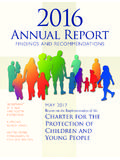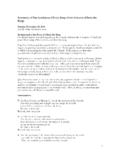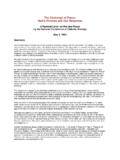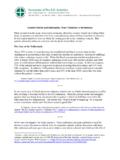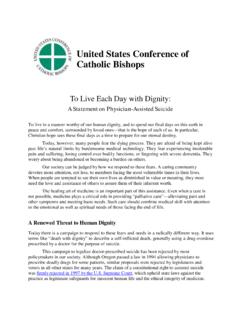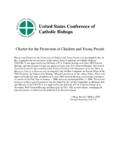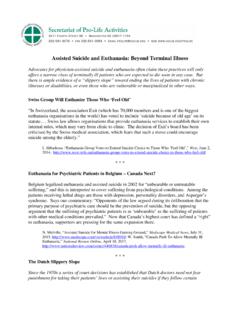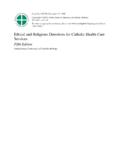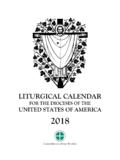Transcription of hange, Loss and Grief: ompanions on the Journey
1 1 Change, Loss and grief : Companions on the Journey By Dr. Ray Mattes, IHM, Recently, during a workshop to a religious community, one of the members spoke of the rapid pace of losses within the community. She proceeded to describe the past few years in terms of the number of members who had died, relinquishment of sponsored institutions, closure of ministries, imple-mentation of alternative governance structures and, more recently, the sale of the congregation s motherhouse. As she spoke, I was reminded of the words of Jan Richardson (see side-bar) and the similarities between what was being described and the image of a Journey .
2 Specifically, it is the Journey which Celtic spirituality refers to as a peregrinatio. Author Karla Kincannon defines peregrinatio as a wan-dering into the unknown void of any specific destination but one that calls the traveler ever deeper into undiscovered terrain. Such a Journey requires the relinquishment of the familiar and an embrace of uncertainty regarding what awaits one during the Journey itself. Love is ultimately what calls the individual forward and guides the steps taken amidst the changes that in-variably occur. In the end, the traveler may never return to the place of origin or, if one does return, one is forever changed by the experience. Fall 2018 Volume 13 No.
3 3 In This Issue Resources 6 From NRRO Offices 7 Announcements 7 Calendar 7 Dr. Ray Mattes, IHM, , a member of the Immacu-late Heart Community of California, currently serves as Administrator of Homecare for the Los Angeles Province of the Sisters of St. Joseph of Carondelet. As a profes-sional gerontologist, he has consulted for numerous religious communities and has been an invited present-er at national gatherings. Dr. Mattes is trained as a spir-itual director as well as being a licensed nursing home administrator and a certified case manager. He holds a in Counseling and Spiritual Care from Wesley Theological Seminary, a MSG in Gerontology and a MPA in Non-profit Management from the University of Southern California, and a MA in Pastoral Theology from Loyola Marymount University.
4 Then let yourself be lost. Let yourself leave for a place whose contours you do not already know, whose cadences you have not learned by heart. Let yourself land on a threshold that mirrors the mystery of your own bewildered soul. Jan Richardson The Cure for Sorrow 2 As we move through the life course, our very wandering is similar to the concept of peregrina-tio. We move from place to place, life event to life event, and situation to situation with, per-haps, a general idea of what lies ahead and, at other times, perhaps not. Yet, we go forward because of the life that calls us to movement. Some of us may be more cautious or deter-mined in our wanderings than others, but re-gardless of the approach, one still moves for-ward.
5 In so doing, we embark upon a Journey of change that leads to transformation. What we may not immediately recognize is the fact that change itself is a process of both relin-quishment and gain. All change entails some form of loss. Some losses experienced are mi-nor resulting in little to no impact apart from be-ing necessary for ongoing growth and develop-ment. Others, however, may be major, resulting in grief reactions within us. The impact of the loss is always determined by the one experienc-ing it, the connection held to that which was lost, and the contextual circumstances surrounding it. Author Judith Viorst, in her book Necessary Losses states that we live by losing, being left and letting go, and sooner or later with more or less pain, we all must come to know that loss is indeed a lifelong human condition.
6 Change and loss become companions on the peregrina-tio that life invites us to embark upon. There are a variety of types of losses that may range from material possessions, roles held by the individual, relationships and system-ic losses to functional losses due to physical and/or cognitive decline. There are also those losses that impact the way one views the self at a particular stage of one s life, the future and the world at large. As such, loss may manifest itself in many forms. While multiple factors can and do influence loss, identifying the impact of loss in both its obvious and not so obvious forms may be helpful for individuals in addressing is-sues and gaining a sense of equilibrium from which to continue the Journey .
7 The more important a person, item, object or activity is to an individual, the more deeply the loss is experienced within a person. The man-ner in which the loss unfolded can also impact one s felt experience. Questions may arise such as whether or not the loss was expected, unexpected, natural or unusual. Additionally, the timeframe in which the loss unfolded as well as whether or not it is permanent or temporary also impacts the individual. The person s past history of the ways in which one addressed loss-es throughout life, along with the skills, tools and Change, Loss and grief : Companions on the Journey , continued Engaging Aging Fall 2018 3 Engaging Aging Fall 2018 means of managing that served them, come into play.
8 From a gerontological perspective multiple losses that occur in rapid succession in some older adults may be seen as being a precursor to other losses that may follow in short order. Losses in people who have provided a person with both support and comfort, ways of doing things and places where one once lived and ministered may all occur in a short duration of time, resulting in a depleted ability to rebound before the next loss is experienced. This possi-ble rapid succession of loss that accumulates in later life may result in what is referred to as bereavement overload defined as an experi-ence that leaves one with a sense of being overwhelmed by multiple losses and drained of resources and energy with which to cope.
9 While change and loss are companions along the peregrinatio to which one is called, so too is grief a particular companion to loss. grief emerges as an indication of what we have held dear. It is a sign of the importance we have placed on what has been lost in our lives and cannot be regained. Life has changed as a re-sult of the losses experienced and its natural emotional reaction is grief . grief , as a process, does not have a specified time frame. It does not contain a set of rules that one follows nor does it occur in precise stages through which one moves in linear fashion. grief is as individualized and fluid as the individ-ual who experiences it. There is no such thing as the right way to grieve.
10 Its experience in life can be one of a roller coaster of emotions with twists, turns as well as ups and downs in a timeframe that does not have a marked ending. This is especially true as one begins to process the losses that initiated the grief only to be con-fronted by new losses and yet another invitation to move deeper along the unfolding Journey . At some point in time, the intensity of the emotions may level off for the person as one comes to in-tegrate what had been lost into the life that is now being lived. Researchers Margaret Strobe and Henk Schut speak to this integration of grief as being a process which encompasses the everyday life events of the person who has experienced a significant loss.
